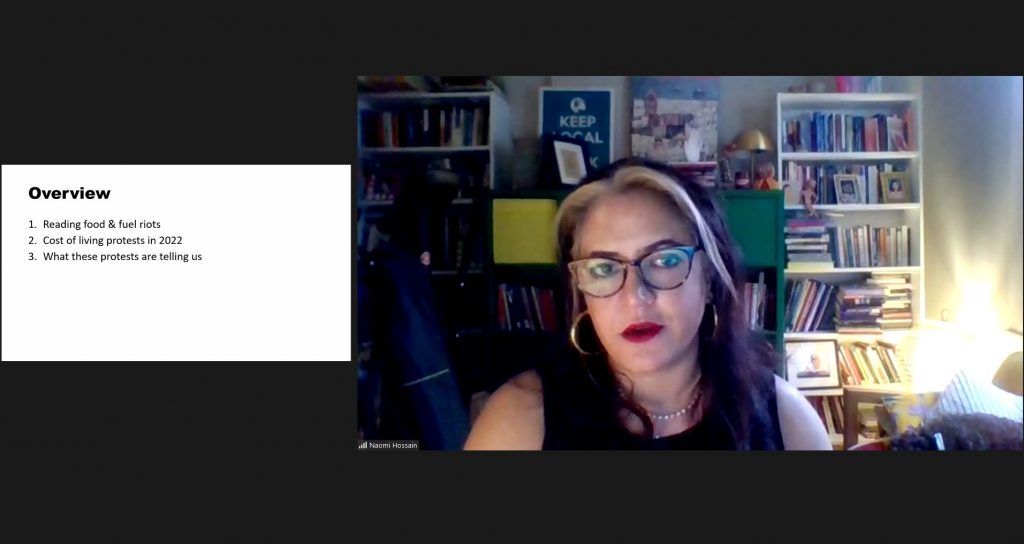On Friday 11 November, Naomi Hossain gave an online lecture at the LSE as part of the Cutting-Edge Issues in Development lecture series on “The Popular Politics of 21st Century Food and Fuel Riots”, with Professor Raj Patel as discussant. Professor Hossain is a political sociologist and Research Professor at the Accountability Research Center at the School of International Service at American University.
Read reflections on the lecture below written by Mihika Dutta and Navya Khanna. You can watch the lecture back on YouTube or listen to it as a podcast.

In an era of ever-growing digitalization, where most economic activities are dependent on fuel, it is imperative to recognize issues of food and energy. The theme for this week’s cutting-edge lecture was ‘The popular politics of 21st century food and fuel riots’ with guest speaker Professor Naomi Hossain. Professor Hossain began by emphasizing the sharp increase in fuel prices over the past few years, especially the last five. In response to this, we have seen major protests across the globe. protests in Ecuador in 2019 and 2022 in response to high fuel costs and inequality and in Sierra Leone in July and August 2022 against rising costs of living, to name but two, showcase how price increases are impacting people so seriously that they feel forced to take to streets to demand government action. She highlighted, “it is not just about economics, it’s about politics as well.” Protesters understand that the disastrous impacts on households and livelihoods due to climate change and food and fuel crises can be addressed by governments if there is political will.
Unfortunately, the current food and energy crises are not the first the world has seen. The last such major global episode was observed in 2007-08. Comparing differences this time around with 2007-08, Professor Hossain pointed out that the crises are now more about fuel than food and they are no longer specific to developing countries. The unfolding of recent events proves that crises neither discriminate between the people in rich and poor countries, nor between different political systems.
Key to understanding how to interpret these protests are ideas of a “right to energy” and “energy nationalism”. Modern life depends on affordable access to energy and ensuring this determines a critical part of the relationship between state and society. Failure of accountability hugely undermines the voices of people and their need to be heard. In contrast to general polarization seen in politics, there is political consensus that governments should protect people from food and energy price hikes.
Commenting further on facts laid out by Professor Hossain, the discussant of the day, Professor Raj Patel made the case for viewing these protests as “rebellions” since it gives more agency to those taking to the streets. In addition, he mentioned the tight correlation between food and oil prices since the food industry demands high energy. He also highlighted the importance of climate change in the context of food prices. He put into perspective the high interest rates seen globally, pointing out that countries with deep debt distress are the ones grappling with fuel rebellions. Towards the end of the discussion, both Professor Hossain and Professor Patel reminded us that an absence of protest does not mean people are not suffering. It is not a numbers game when it comes to protests, rather the gravity of the rebellion that matters.
– Mihika Dutta
________________________
In her lecture on “The Popular Politics of 21st century food and fuel riots” last Friday, Professor Naomi Hossain underlined the real reasons why people protest the rise in food and fuel prices. They are not just protesting the increase in living costs, but by coming to the streets they are demanding dignity and respect from their respective governments.
She also pointed out that these protests are not only organized in the Global South – there has been a sharp increase in such protests in the Global North as well. In the Global North, it is more about the energy crisis than food. Food prices are inherently linked with fuel prices because the food industry demands a lot of fuel. Professor Hossain and the lecture’s discussant, Professor Raj Patel also emphasized the interconnectedness of issues like climate finance, the financialization of food, and energy politics. These protests are also connected to the idea of politics of care which essentially challenges the liberal notion that there are finite resources in society and these cannot be distributed to every individual.
According to Professor Hossain, the underlying problem behind the rise in such protests is the failure of accountability of the state and the collusion between the political and economic elites of the country. She urged policymakers to look closely at these protests because they tell us about the existing condition and practices of societies and the systemic conflicts which are forcing people to take to the streets. The governments of the countries in which such demonstrations are happening try their best to vilify the protesters rather than take responsibility, as the protests are proving how the state policies have failed them.
During such uncertain times, media representation plays a huge role. Professor Patel diverted our attention to how the media blamed Sri Lanka’s decision to switch to organic farming as the reason for its bankruptcy. However, it was its economic crisis which made it impossible to buy fertilizers and forced farmers to switch to organic farming. The one thing which struck me the most from Professor Hossain’s lecture was the active participation of university students in such protests. Food and fuel protests are often led by young people who are deeply affected by the rise in the prices of such essential items and inclined to act against governments who are failing to protect their interests and their futures.
– Navya Khanna
The next guest lecture in the Cutting-Edge Issues in Development series will be with Jayati Ghosh on Friday 18 November on “Why Inequality Is The Basic Driver Of The Climate Crisis, And What We Can Do About It“. Members of the LSE community can attend in person (contact d.patel20@lse.ac.uk for details) and the wider public can register to attend via Zoom.
The views expressed in this post are those of the author and do not reflect those of the International Development LSE blog or the London School of Economics and Political Science.
Main Image credit: Indigenous women protest against the government in Quito, Ecuador on June 23 2019 via AFP and voanews.com.





